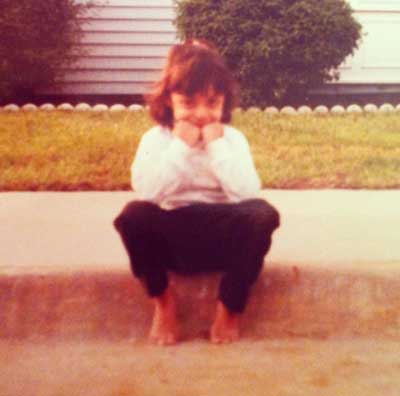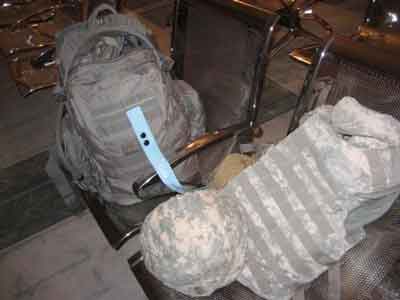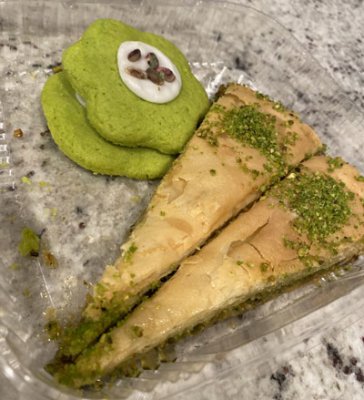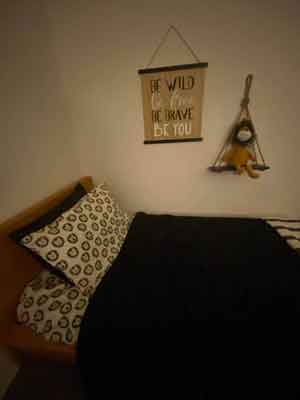The Country We Loved Didn’t Love Us Back. Maybe This Time Would Be Different.
My room is my very own special place,
will I decorate it with leather
or with lace?
Grade school poetry at its finest, I wrote these deeply profound words while daydreaming about having my very own bedroom someday. An introvert within a boisterous Desi family, I longed for space to take a deep breath after a long day—a refuge with posters of butterflies and kittens, and a desk for my journals and sticker collection.
Being outdoors was my sanctuary back then. I caught tadpoles and turtles in a muddy creek with my brother and biked freely throughout the neighborhood with friends. We’d spin and jump off the steel roundabout at the playground and gather in a cul-de-sac with neighbors for sparklers and fireworks on the Fourth of July. After dark, my siblings and I would head home, where our family of nine squeezed into a three-bedroom, 1,320-square-foot townhouse.

Sadia Heil as a little girl in her old neighborhood. Photo courtesy of the author.
I recently passed through my childhood neighborhood, and it was much smaller than I remembered. The wooden bus stop where Phyllis painted a wondrous lion mural with emerald leaves was gone. Vinyl slides and new swingsets replaced the steel roundabout at the playground near Rose’s house. Ms. White’s once-polished home looked almost deserted, and the pale siding on our old home appeared fresh.
As I drove away, I thought about where I’d slept—and I couldn’t remember. I had been too old for the crib in my parent’s room; that’s where my brother napped, and my sisters split the other two bedrooms.
“Mom, where on Earth did I sleep back then?” I asked a few days after my drive.
“Either on the twin bed in my room or on a bistar, Sadia.”

Sadia Heil’s gear at a PAX terminal somewhere in Iraq. Photo courtesy of the author.
Aha! With blankets and sheets on the floor forming the shape of an actual bed, a bistar is like a homemade sleeping bag. I made a bistar once at Camp Speicher’s passenger terminal, my body curled into the fetal position as I converted my three-day bag into a pillow and waited for a flight back to Baghdad.
There was no room for bistars in the overcrowded C-17s leaving Kabul during the Afghanistan withdrawal in August 2021.
I remember watching souls shelter in the colossal wheel wells, as huddled masses climbed aboard the herculean aircraft. Meanwhile, hundreds of others—resembling my brothers and uncles in flowing shalwar kameez and vests—raced toward a chance at freedom, a chance at life.
When videos of humans falling from the Kabul sky bombarded my news feed that August, my heart sank, and old feelings I’d boxed away flooded back in. Two decades earlier, the harrowing image of humans falling from the New York sky had haunted my teenage memories.
I remember how my world changed after 9/11. In an instant, my family transformed from “Gandhis” to “terrorists.” The country we loved didn’t love us back.

Pistachio cookies and baklava for new arrivals from Afghanistan. Photo courtesy of the author.
As the 20th anniversary of Sept. 11 approached, I braced for Islamophobia and worried about how our nation would receive Afghan refugees. I confided in my friend, Stevie, her endearing Midwestern spirit as bright as the bold red lipstick she wears with unabashed confidence. Would they be welcomed? Or would they experience a bigoted backlash? These thoughts consumed me—beginning in my stomach, lingering in my chest before moving into my throat, then down my forearms to the tips of all my fingers simultaneously.
A few weeks later, on a sunny mid-September day, those same fingers calmly tucked my daughter’s fine hair behind her ears and reassuringly held her shoulders:
“We will meet up with a few other military families and help set up a home for a little boy who just came from Afghanistan. Can you give him some of the toys we just bought?”

Earlier that afternoon, I had grabbed naan, halal meat, pistachio cookies, and baklava from the local Afghan market, and my daughter picked out a few toys, along with a plush Mickey Mouse blanket. When we arrived at the apartment complex, at least a dozen others had already begun to unload moving trucks, assemble furniture on the grass, and make friends with two Afghan girls who curiously watched the whole effort, eager to meet their new neighbors.
“How do you say ‘welcome’?” a few of the helpers asked.
“Khosh Aamadid,” the girls cheerfully replied.
In the blink of an eye, the spirit of those who welcomed this refugee family extinguished my debilitating anxiety. Their beacon hands and mild eyes were as heartening as a fresh slice of apple-pecan pie on a breezy fall afternoon. Amid a storm of disarray and helplessness, hope anchored the families of the airmen, soldiers, sailors, Coast Guardsmen, and Marines I met that day—the hope of offering this family a chance at freedom, a chance at life.
Soon after, the young couple and their little boy arrived. Kind and humble, their tired faces emanated resilience and relief. As we set up the apartment, I watched my daughter hand a toy truck to the four-year-old boy, and I felt so conflicted.

Volunteers create a new bedroom for an Afghan boy. Photo courtesy of the author.
What did he overcome to get here?
Will he remember?
“Although we may never be able to repay you, we appreciate everything,” his parents said between tears. “Thank you.”
They’ll remember.
That evening, I looked through photos of the family’s new home: pink and gold teacups in the kitchen, a blanket ladder of prayer rugs in the living room, and the little boy sleeping in a twin bed—in his very own bedroom. Above him, a stuffed lion sat on a swing next to a scroll that said, “Be wild, be free, be brave, be you.”
I hope we remember.
I hope we safeguard the little boy and his parents from limbo before their humanitarian parole expires. I hope we keep our promises.
Award-Winning Journalism in Your Inbox
It’s been decades, and the details of my first childhood home remain a musky smog that drifts like secondhand smoke from Dad’s Marlboro Reds. Still, I remember being embraced by our neighbors—Ms. White, Phyllis, Rose, and their children—who introduced us to football, fireworks, and the spirit of America.
I hope the dreaming boy—in his very own special place—remembers, too.
This War Horse reflection was written by Sadia Heil, edited by Kelly Kennedy, fact-checked by Jess Rohan, and copy-edited by Mitchell Hansen-Dewar. Headlines are by Abbie Bennett.





Comments are closed.